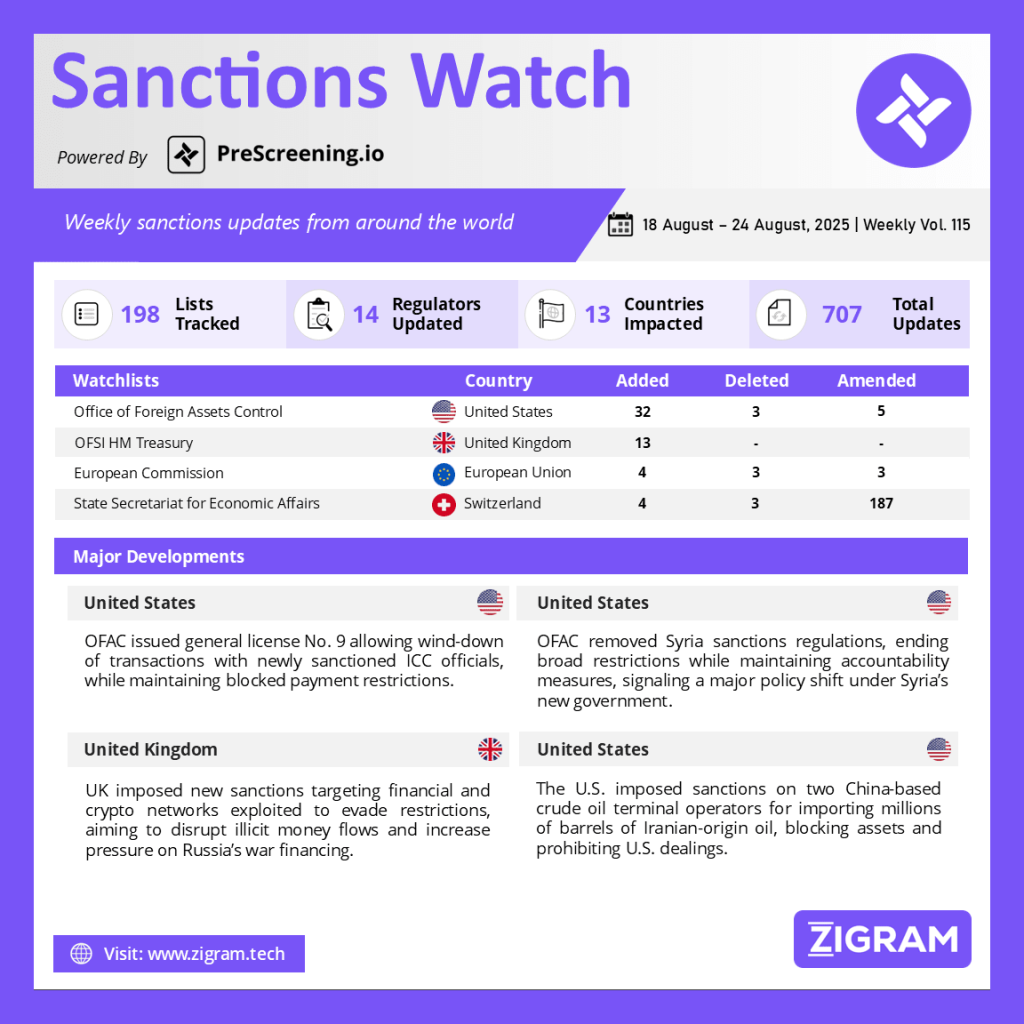Sanctions Watch Vol 115
In the latest edition of our Sanctions Watch weekly digest, we present significant updates on sanction watchlists and regulatory developments.
1. OFAC Issued General License No.9 for Wind-Down of ICC-Related Sanctioned Transactions
The U.S. Department of the Treasury’s Office of Foreign Assets Control (OFAC) issued General License No. 9 under the International Criminal Court-Related Sanctions Regulations (31 CFR part 528). The license authorizes the wind-down of transactions involving certain ICC officials who were designated on the same day, including Nicolas Yann Guillou, Nazhat Shameem Khan, Mame Mandiaye Niang, and Kimberly Prost. The authorization is effective until September 19, 2025, with the condition that any payments to blocked persons must be directed into a blocked, interest-bearing account in the United States.
The move follows the Treasury Department’s broader action to impose sanctions in response to the ICC’s perceived threats to U.S. and Israeli officials. OFAC also updated its Specially Designated Nationals and Blocked Persons (SDN) List to reflect these designations. The measure underscores the U.S. government’s continuing stance against ICC activities that it views as overreaching and against American and allied sovereignty.
2. OFAC Removes Syria Sanctions Regulations, Marking New Era in U.S.–Syria Relations
The U.S. Department of the Treasury’s Office of Foreign Assets Control (OFAC) formally removed the Syrian Sanctions Regulations from the Code of Federal Regulations, marking a major shift in U.S. foreign policy toward Syria. This action follows Executive Order 14312, issued on June 30, 2025, which revoked long-standing sanctions imposed under the national emergency declared in 2004.
The sanctions were originally enacted due to Syria’s support for terrorism, pursuit of weapons of mass destruction, and destabilizing regional activities. Over the years, they were expanded to address human rights abuses, the Assad regime’s actions, and links to chemical weapons proliferation. However, recent developments under the new Syrian government led by President Ahmed al-Sharaa prompted the U.S. to reconsider its stance. The administration determined that the conditions justifying the national emergency had fundamentally changed.
While the removal ends broad sanctions against Syria, it does not extend relief to terrorist organizations, human rights abusers, or entities tied to chemical weapons and narcotics trafficking. Certain individuals previously sanctioned have been redesignated under updated authorities to ensure accountability. The regulatory repeal takes effect with its publication in the Federal Register, solidifying a new phase in U.S.–Syria relations
3. UK Cracks Down on Russia’s Sanctions Evasion via Kyrgyz Bank and Crypto Schemes
The UK government announced a new wave of sanctions targeting financial networks and cryptocurrency platforms exploited by Russia to evade Western restrictions. The measures focus on Kyrgyzstan’s Capital Bank and its director, Kantemir Chalbayev, accused of facilitating payments for Russian military goods. Additionally, sanctions were imposed on the Grinex and Meer cryptocurrency exchanges, as well as the infrastructure behind the rouble-backed crypto token A7A5, which has reportedly transferred over $9.3 billion in just four months.
These networks were designed to circumvent sanctions imposed by the UK and its allies, using opaque banking routes and digital assets to conceal transactions. The move aligns closely with recent U.S. measures, highlighting the transatlantic partnership to counter sanctions circumvention.
Sanctions Minister Stephen Doughty emphasised that the UK will not allow Russia to exploit “dodgy crypto networks” to fund its war in Ukraine. The announcement followed a high-level meeting in Washington involving Prime Minister, European leaders, President Zelenskyy, and U.S. President Trump, reaffirming allied commitment to a just and lasting peace.
The latest sanctions strengthen pressure on Moscow’s financial lifelines, signalling the UK’s determination to choke off illicit money flows sustaining Russia’s invasion of Ukraine.
4. U.S. Expands Sanctions on China-Based Oil Terminals to Disrupt Iran’s Crude Network
The U.S. Department of State announced a new round of sanctions targeting Iran’s oil supply chain, intensifying its “maximum pressure” campaign. The action designates two China-based crude oil terminal and storage operators—Qingdao Port Haiye Dongjiakou Oil Products Co., Ltd (DJK Oil Products) in Shandong Province and Yangshan Shengang International Petroleum Storage and Transportation Co., Ltd (Yangshan Shengang) in Zhejiang Province. Both companies played critical roles in importing millions of barrels of Iranian-origin crude oil, often through shadow fleet tankers already sanctioned by the United States.
DJK Oil Products, operating in the Dongjiakou Port Area, was found to have imported at least 65 million barrels of Iranian crude since December 2024, much of it marketed by the National Iranian Oil Company (NIOC), itself under U.S. sanctions. Meanwhile, Yangshan Shengang received over 4 million barrels of Iranian oil between April 2024 and March 2025, including shipments from multiple U.S.-designated vessels such as Turaco and Vladimir Arsenyev.
Under Executive Order 13846, the sanctions freeze all U.S.-linked property and prohibit American entities from engaging with these companies. The move underscores Washington’s intent to cut Iran’s oil revenues, pressure its regime, and curb funding for destabilizing activities across the Middle East.
Know more about the product: PreScreening.io
Click here to book a free demo.
Sanctions Watch is a weekly recap of events and news related to sanctions around the world.
- #OFAC
- #SanctionsRelief
- #SyriaPolicyShift
- #USSyriaRelations
- #RussiaSanctions
- #CryptoEvasion
- #IranOil
- #ChinaSanctions

